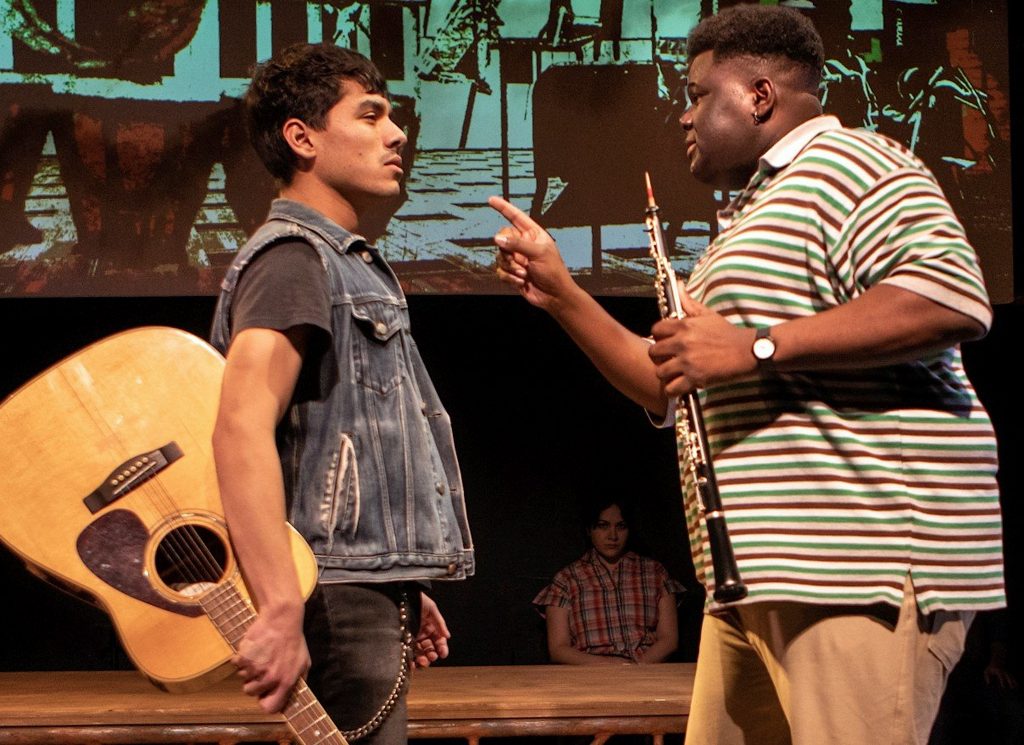Freddy Acevedo possesses a range as wide as any theater artist you’ll meet. A strong presence on Kansas City stages in recent years, locally the Texas-born actor/producer/playwright/educator has played a valiant Jonathan Harker (Dracula, Kansas City Actors’ Theatre), a wittily hyperactive Rafael (Clyde’s, Unicorn Theatre), an elegant Paris (Romeo and Juliet, Heart of America Shakespeare Festival), and an adorable Sebastian (Twelfth Night, Kansas City Repertory Theatre).
But the graduate of UMKC Conservatory’s Master of Fine Arts program does not shy from roles that routinely present themselves to a first-generation Mexican American — including some that could, at first glance, be viewed as playing to stereotypes.
“I’m pretty mindful of what I submit for” said the actor, who was also a member of New York’s prestigious LAByrinth Theater Company Intensive Ensemble. “I’ll play the undocumented immigrant, I’ll play the gardener, or whatever … but only if I believe in the story.”
For TheatreSquared’s recent production of Tony Meneses’ Twenty50, for example, Freddy appeared in the pivotal role of Oscar, an illegal immigrant of the future who stumbles onto the property of congressional candidate Andrés Salazar.
The turmoil that Oscar’s presence provokes among the upwardly mobile family is mitigated by Salazar’s very human realization that he sees something of his own son in Oscar.
Meneses, by the way, is another of a growing number of Latinx artists — including actors, playwrights, and directors — who are ready to tell their own stories. And the more a community tells its truths, the more grounded, realistic, and human those stories become. (When others tell your story, the result is “this romanticized version of yourself that’s living in someone else’s head,” Freddy said, adding with a laugh: “When in fact, we’re actually kind of normal.”)
For his part, Freddy took up a personal story in La Intrevista, an original play created for the Kansas City Public Theatre’s Lab that tells of his own mother’s road toward gaining U.S. citizenship. And this summer, Freddy and fellow actor/playwright Jerry Mañan created Maquinitas, an inventive two-man KC Fringe play that used improv, audience interaction, and rapid-fire bilingual dialogue to tell a story of overworked laborers and their grueling, sometimes hilarious, tribulations.

“I really enjoy doing new work,” Freddy said, also mentioning his involvement with LAByrinth Theatre’s Intensive — a program that emphasizes new work and especially that by BIPOC artists. (The New York Times called Freddy’s portrayal of Danny Guerrero, in the LAByrinth production of David Anzuelo’s Día y Noche, “cooler than cool.”)
Freddy was also part of Karen Lisondra’s and Amado Espinoza’s Pachakutec project, which began at the UMKC Conservatory and subsequently toured Bolivia, in Spanish: a 75-minute feast of theater, music, and movement that examines how ancestral wisdom can address questions of religion, health, sexual identity, and family.
Freddy is the oldest of three first-generation American sons, born to immigrants from the state of Zacatecas. He was raised in Ft. Worth, Texas by caring parents who worked multiple jobs to make a better life — and who, ultimately, supported their first-born’s daring decision to enter the theater.
One of Freddy’s earliest memories was of being enchanted by a puppet theater presentation at his grade school. It wasn’t until college, however, that he began to regard theater as a potential course of study. “I can’t say that this or that one thing made me want to pursue acting,” he said. “I grew up watching actors like Esai Morales and Edward James Olmos, but it didn’t really ‘click’ until I took an acting class at community college.”

Later, at Texas A&M University-Corpus Christi, he began “dipping his toes” into theater, and particularly into “the idea of devising and creating my own material.” At some point during his MFA program, it became clear that this determined young man was an artist in the making.
The future offers Freddy a range of options: His winning smile and sparkle make him a favorite for television and commercial work. In fact, he would love to pursue more television and even film, though live theater remains his passion.
He values the idea of Latinx and other BIPOC artists taking on the whole range of theater and giving it a new spin, “to be constantly pushing back against antiquated systems and old ways of thinking.”

Among his dream roles are some of the more inward-looking Shakespeare parts: Edmund in King Lear, Cassius in Julius Caesar, Iago in Othello — “roles that are maybe a little bit darker,” he said. “I love the challenge of humanizing those people that we’re supposed to root against.”
Yet to a certain extent, Freddy’s destiny seems tied up with his own origin story. As he states in his biography, he “embraces the beautiful burden that is redefining the immigrant mindset.” He feels an obligation to carry to the next level the life that his family helped carve out.
“First-generation Americans like me have a responsibility to go beyond,” he said, “to take that same work ethic but add onto it our visions and dreams for the future.” He treasures the idea of telling stories that “shine a light … in a way that helps us appreciate my entire family’s experience a little bit better.”
—By Paul Horsley
For more about Freddy and his schedule go to freddyacevedoactor.com. To reach Paul Horsley, performing arts editor, send an email to paul@kcindependent.com or find him on Facebook (paul.horsley.501) or Twitter/Instagram (@phorsleycritic).
